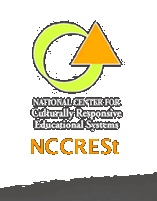
---

---

---

---

---

|
 |
 |
NCCRESt
part of the Education Reform Networks
You are in:
Subject —>
Immigration
-
"E Pluribus Unum": What Does it Mean? How Should We Respond?
Charts the intellectual history of competing conceptions of national unity, diversity, and ethnic identity. Explicates three models: monolithic integration (monocultural assimilation of diversity), pluralistic preservation (diversity and unity as equal values), and pluralistic integration (stressing consensus about core civic values while acknowledging the compatibilities and tensions regarding unity and diversity).
-
A Student's Guide to Polish American Genealogy. Oryx American Family Tree Series
This book offers a guide to the study of genealogy, or family history, through the use of historical documents, artifacts, and private records. Intended mainly for students who wish to trace their family roots, the book also can be used by anyone interested in the lives of Polish Americans throughout the years.
-
Children of La Frontera. Foreword
The linguistic and cultural diversity of America's school population has increased dramatically during the past decade, and is expected to increase even more in the future. But, for many children of immigrant and minority families, U.S.
-
Editorial. Immigration and Urban Education in the New Millennium: The Diversity and the Challenges
Introduces a special issue that explores new immigration trends and major issues related to K-12 schooling in urban areas. The seven articles fall into three categories: a national and historical overview; examples of two types of educational change; and the acculturation and schooling experiences of various racial/ethnic immigrant groups.
-
Immigration and Multiculturalism: Issues in Australian Society and Schools
Examines the relationship between immigration and multiculturalism in Australian society, beginning with a brief historical background on immigration. Discusses how teaching immigration and multiculturalism is constructed in the curriculum and probes the nature of the current debate over immigration policy and multiculturalism.
-
Immigration and Pluralism in Urban Catholic Schools
Investigates how Catholic schools are making the transformation from national to multicultural schools as they meet the needs of new immigrants in the inner city. Focuses on the concept of mediating institutions, investigating urban Catholic school principals' willingness to experience diversity.
-
Improving Education for Immigrant Students: A Guide for K-12 Educators in the Northwest and Alaska
This guide provides educators with information and resources for gaining a better understanding of immigration and the immigrant experience and suggests strategies and techniques to meet the educational needs of immigrant students within regular classrooms. The first section provides a brief overview of the history and current status of immigration in the United States, including current immigration law.
-
Making Our Mark: Defining "Self" in a Multicultural World
Suggests that the classroom is an ideal place to "struggle to be together in our differences," as students begin to formulate their definitions of self and others, and need to learn to deal with differing attitudes and opinions. Describes experiences in the author's class as discussion about immigration in the United States blazed into a discussion about race.
-
Now You See It; Now You Don't: A District's Short-Lived Commitment to an Alternative High School for Newly Arrived Immigrants
Describes the response of an urban school district to the unexpected enrollment of large numbers of newly arrived immigrants. Focuses on the processes that resulted in the implementation of an alternative high school and its abrupt closure a year later, and explores the implications of these decisions for policy and practice.
-
Refugee Children in the Early Years
Describes the findings of a research study by the Refugee Council (United Kingdom) on the experiences of refugee children in "early years provision" (early childhood education). The major finding is that refugee children, of whom there are an estimated 65,000 in the United Kingdom, do not have equal access to early-years education.
-
Refugee Pupils: A Headteacher's Perspective
Although challenges faced by refugee children in English schools are those faced by all students, theirs are exacerbated by their refugee status. Particular problems are those of student migration, language, culture, home and school relationships, the pastoral aspect of school care, and the need for time to deal with the child as an individual.
-
Responding to Undocumented Children in the Schools. ERIC Digest
This digest discusses public schooling for undocumented immigrant children--children born outside the United States who live here without permission of the federal government. Most are children of agricultural workers.
-
The Accelerating Change of American Diversity
Discusses three aspects of changes underlying the "New Multiculturalism": intermarriage, "tipping" of racial and ethnic balances (due to differential birthrates and immigration patterns), and transnational cultures. Educational ramifications include changes in administrative record keeping, evolving student identities, acculturation, intergroup relations, and curriculum.
-
Using Stories To Introduce and Teach Multicultural Literature
Discusses the importance of stories in introducing migrants to the new societies they enter. Stories allow people to reach out to past generations and provide examples of successful coping in new lives.
|
| |
 |
|





